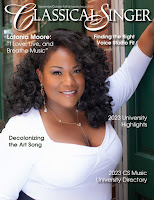As I continue to glean insights from Trauma and the Voice: A Guide for Singers, Teachers, and Other Practitioners by Emily Jaworksi Koriath (previously discussed here), I wanted to share some additional thoughts explored in the book regarding how environment impacts learning.
On college campuses, there has been a lot of talk in recent years about creating "safe spaces." After some criticism that safe spaces can become passive bubbles where everyone is comforted and never challenged, the conversation seems to have shifted toward building "brave spaces." Instead of allowing students to cocoon in safety, a brave space is designed for risk-taking and big leaps, but within an environment where such actions will be supported.
As Koriath points out, however, safety is a crucial requirement for learning. She writes, "The type of environment we need to strive to create and protect is one of psychological safety." This term, first coined by Harvard organizational and behavioral scientist Amy Edmondson, indicates a setting "where one can show oneself without fear of consequences to their self-image or career, and where the climate is characterized by trust and mutual respect."
Teachers who work to establish this sort of learning environment (in the classroom or the voice studio) understand that some truths or criticisms are difficult to hear and can inspire negative reactions from students. Therefore, when we share our assessments, we have to do so with compassion and empathy. As Koriath says, "We can't shield students from the truth, but we also can't ignore that some truths are painful and take time to digest."
In certain teaching models (notably the Master-Apprentice approach), some teachers prioritize handing out blunt truths, regardless of how they may be received. They believe their job is to get right to the issue, sometimes bombarding students with criticisms regardless of how they might impact a student's psyche. There is plenty of research about how ineffective that is as an overall teaching strategy (which I may share in another blog), but it also seems to be, at best, a bit clueless and, at worst, unnecessarily mean. As the saying goes, people who pride themselves on being "brutally honest" are often more interested in the brutality than the honesty.
Another problem with such an approach is that criticisms can easily morph into abusive behaviors. As Koriath flatly states, "Verbally abusing students with the aim of 'toughening them up' is harmful. Telling students that they will never succeed is harmful." She admits that the performing arts industry can be cruel at times, and that it could be considered negligent not to let students know about the potential difficulties they may face as they move into the professional world. Still, for too long, some teachers have used borderline abusive language with students while hiding behind the excuse that it's "for their own good."
As I noted, there has been some criticism of safe spaces, brave spaces, or any other efforts designed to change traditional learning environments. Some people (usually legislators or media figures, not actual educators) think those environments coddle students and will end up turning everyone into snowflakes. To this point, Koriath highlights an important element that sometimes gets lost in this discussion: "resilience skills come after safety and stability are established." In other words, if you want students to actually "toughen up," to have greater tenacity, to be able to bounce back from failures, to take criticism without crumbling, that is developed most effectively in an environment where they feel psychologically safe. Once those skills are in place, they can be implemented in less friendly (or even in hostile) environments.
Given all of this, here are some questions to ask yourself about the environments you create for yourselves and the environments you step into. When you practice your singing, do you do so in a place where you feel psychologically safe? (Not in a place where you feel others may hear you and harshly judge you.) Do your voice lessons feel like psychologically safe spaces? (If not, let's talk about how we can change that.) Do you create performance environments (small audiences of friends, classmates, loved ones) where you can feel psychologically safe before you go into more high-stakes performance settings? What else might you be able to do in order to allow yourself these important opportunities to develop resiliency?
Also worth considering, are you allowing psychologically safe spaces for others? Do you clear out of the house (or put on headphones) when your roommates needs to practice? Do you encourage your classmates to speak up if their voice lessons don't feel psychologically safe? Are you a psychologically safe audience member for classmates (either in your classes together or in impromptu meetings)?
Safety first, then resilience.
Now go practice.


